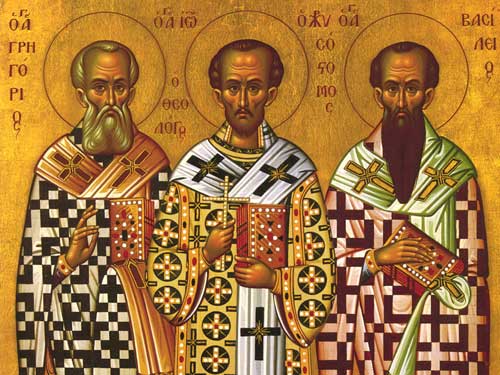Protocol No. 06/19
January 30, 2019
Feast of the Three Hierarchs and Greek Letters Day
To the Most Reverend Hierarchs, the Reverend Priests and Deacons, the Monks and Nuns, the Presidents and Members of the Parish Councils of the Greek Orthodox Communities, the Distinguished Archons of the Ecumenical Patriarchate, the Day, Afternoon, and Church Schools, the Philoptochos Sisterhoods, the Youth, the Hellenic Organizations, and the entire Greek Orthodox Family in America
Beloved Brothers and Sisters in Christ,
We give glory and thanksgiving to God on this blessed commemoration as we honor the memory of three holy luminaries who continue to guide and inspire us through the wisdom of their teaching and the sanctity of their lives. Basil the Great, Gregory the Theologian, and John Chrysostom, recognized in the tradition of our faith as the Three Great Hierarchs and Ecumenical Teachers, offer to us through the witness of their lives beautiful examples of commitment to God and service to Him and others through the power of His divine love. Through their work as pastors and faithful stewards of the people of God, they are true images of the grace revealed to us by Christ. As skilled and prayerful theologians, they show us that the path of faith and truth is followed by those who are transformed by God’s love and offer it to others.
The Three Hierarchs understood and experienced the love of God as revealed in Christ, and this love was the foundation of their service and teaching. In advancing and applying the work of earlier theologians and defenders of the Christian faith, they often used the word philanthropia to express the relationship of God’s love for us to our calling to show this love in our response to the needs of others. Basil the Great uses the word philanthropia when speaking of God’s revelation through Christ, “Shall it strike us with amazement at the mighty power and love to humankind of the Savior, in that He both endured to suffer with us in our infirmities and was able to come down to our weaknesses” so that He might end our “conflict with death” and give us “freedom from suffering.” (On the Spirit)
Gregory the Theologian addresses the love of God for us throughout many of his writings, and he expresses the meaning of philanthropia as the “manifold love of God toward humankind” in following the use of the word by the Apostle Paul in his letter to Titus. In his exhortation Paul states, But when the goodness and lovingkindness of God appeared, He saved us, not because of deeds done by us in righteousness, but in virtue of His own mercy…which He poured out upon us richly through Jesus Christ our Savior so that we might be justified by His grace and become heirs in hope of eternal life. (Titus 3:4-7)
For the Three Hierarchs the revelation of the abundant and saving love of God through Christ and His love for humankind was the foundation of our love for others. The grace revealed should be known and expressed through our response in love to the needs of our fellow human beings. St. John Chrysostom also used the word philanthropia to express this essential truth of our faith. At the conclusion of many of his homilies, he exhorted his hearers to be filled with the “grace and love for humanity of Jesus Christ.” Chrysostom also shared with his other contemporaries the understanding that our philanthropia is our response to the grace of God expressed through our worship and through the Holy Eucharist. As our worship is an expression of love, and as through the Eucharist we receive the love of God, that love guides us to confirm our shared humanity and respond to the poor, the sick, and any who have need. For Chrysostom, just as the love of God for us has no boundaries, our philanthropia should be unlimited.
The use of the word philanthropia by the Three Great Hierarchs affirms another aspect of our commemoration of this day. Our tradition is to join the feast of these Saints with the celebration of Greek Letters Day in recognition of the rich and beautiful connections between our Orthodox faith and our Hellenic heritage. This relationship is deep and meaningful in so many ways, especially in language. Philanthropia in ancient Greek culture was seen as a primary virtue of rulers, embodying the expression of benevolence and kindness to their subjects. Following its use by the Apostle Paul, the word was applied by Christian theologians, and as seen above, by the Three Hierarchs to describe both the love of God for humanity and the love we should also have and share for humanity. On this day of Greek Letters, we have before us a beautiful example of how language and its application can expand the meaning of our faith and broaden our understanding of our relationship with God and our calling to be witnesses of His Grace.
In our celebration of this Feast of the Three Hierarchs and our observance of Greek Letters Day, let us be thankful for the relationship of our faith and heritage and the multitude of connections that we see and experience. In our philanthropia toward others, may we continue to share this relationship as we engage and understand our human experience and purpose, and especially as we are witnesses of God’s limitless and transforming love that is offered to each and every human being.
With paternal love in Christ,
† D E M E T R I O S
Archbishop of America
